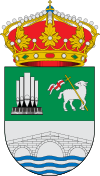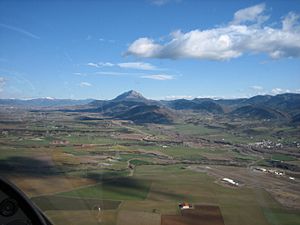Santa Cilia facts for kids
Quick facts for kids
Santa Cilia (Spanish)
Santa Zilia (Aragonese)
|
|||
|---|---|---|---|
|
|||
| Country | Spain | ||
| Autonomous community | Aragon | ||
| Province | Huesca | ||
| Comarca | Jacetania | ||
| Area | |||
| • Total | 28 km2 (11 sq mi) | ||
| Elevation | 649 m (2,129 ft) | ||
| Population
(2018)
|
|||
| • Total | 231 | ||
| • Density | 8.25/km2 (21.4/sq mi) | ||
| Time zone | UTC+1 (CET) | ||
| • Summer (DST) | UTC+2 (CEST) | ||
Santa Cilia (also called Santa Zilia in Aragonese) is a small town in Spain. It is located in the Jacetania area, within the province of Huesca, in the region of Aragon. Santa Cilia is about 14 kilometers (about 9 miles) from the town of Jaca. It sits between the River Aragon and the main highway N-240.
Contents
History of Santa Cilia
The story of Santa Cilia is closely connected to the Royal Monastery of San Juan de la Peña. This link goes all the way back to the 10th century. In 1336, the town faced a very difficult time. It was almost empty and damaged because of many problems, including sickness and heavy taxes on its people.
Around that same time, the old part of the town was rebuilt. It was designed with a layout of about six straight blocks. This design reminds people of how ancient Roman army camps were set up.
The town's church was also rebuilt. It replaced an older church from the Middle Ages. A tall bell-tower was added to the church in 1646. Later, in the 18th century, walls were built to protect the church from floods from the river.
There was once an important medieval bridge over the River Aragon. This bridge was 160 meters (about 525 feet) long and had eight arches. It was a "toll bridge," meaning people had to pay a small fee to cross it. This bridge is now broken.
Santa Cilia officially became its own municipality (a local government area) in 1834. The town reached its largest population in 1920, with 520 people living in about 90 houses. However, many people later moved away. They went to places like Argentina, France, and the city of Barcelona. This reduced the town's size to what it is today.
Population Data
Here is how the number of people living in Santa Cilia has changed over time. This information shows the population from 1842 to 2007:
| 1842 | 1877 | 1887 | 1897 | 1900 | 1910 | 1920 | 1930 | 1940 | 1950 | 1960 | 1970 | 1981 | 1991 | 2010 |
|---|---|---|---|---|---|---|---|---|---|---|---|---|---|---|
| 291 | 408 | 434 | 412 | 484 | 511 | 506 | 437 | 424 | 431 | 362 | 253 | 214 | 158 | 209 |
Modern Life in Santa Cilia
Santa Cilia has an airfield that is very popular. Many glider pilots come here to fly their gliders. They enjoy exploring the nearby Pyrenees mountains from the sky.
Nearby Villages
Santa Cilia is the main town, but there is also another small village nearby:
- Santa Cilia
- Somanés is a very small village, sometimes called a hamlet. It has about 14 people living there. Somanés became part of the Santa Cilia municipality in 1969. It has a beautiful church from the 18th century. This church is built in the Baroque style and is dedicated to San Ramon.
Festivals and Celebrations
Santa Cilia celebrates several special days throughout the year:
- 30 April: This is a Romería a la Virgen de la Peña. A romería is a religious trip or pilgrimage, often to a shrine or holy place.
- 15 May: The town celebrates San Isidro. This festival honors Saint Isidore the Laborer, who is the patron saint of farmers.
- 8 September: This day celebrates La Natividad de la Virgen, which means the Birth of the Virgin Mary.
See also
 In Spanish: Santa Cilia para niños
In Spanish: Santa Cilia para niños





